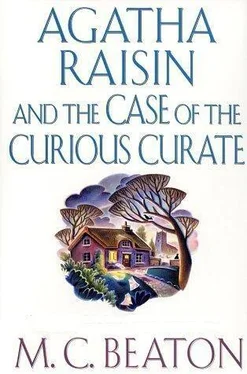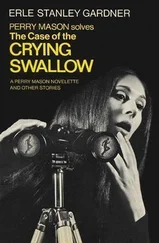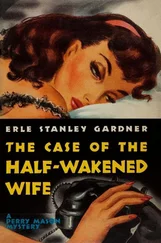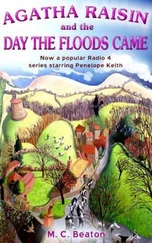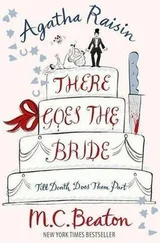M.C. Beaton - The Case of the Curious Curate
Здесь есть возможность читать онлайн «M.C. Beaton - The Case of the Curious Curate» весь текст электронной книги совершенно бесплатно (целиком полную версию без сокращений). В некоторых случаях можно слушать аудио, скачать через торрент в формате fb2 и присутствует краткое содержание. Жанр: Старинная литература, на английском языке. Описание произведения, (предисловие) а так же отзывы посетителей доступны на портале библиотеки ЛибКат.
- Название:The Case of the Curious Curate
- Автор:
- Жанр:
- Год:неизвестен
- ISBN:нет данных
- Рейтинг книги:5 / 5. Голосов: 1
-
Избранное:Добавить в избранное
- Отзывы:
-
Ваша оценка:
- 100
- 1
- 2
- 3
- 4
- 5
The Case of the Curious Curate: краткое содержание, описание и аннотация
Предлагаем к чтению аннотацию, описание, краткое содержание или предисловие (зависит от того, что написал сам автор книги «The Case of the Curious Curate»). Если вы не нашли необходимую информацию о книге — напишите в комментариях, мы постараемся отыскать её.
The Case of the Curious Curate — читать онлайн бесплатно полную книгу (весь текст) целиком
Ниже представлен текст книги, разбитый по страницам. Система сохранения места последней прочитанной страницы, позволяет с удобством читать онлайн бесплатно книгу «The Case of the Curious Curate», без необходимости каждый раз заново искать на чём Вы остановились. Поставьте закладку, и сможете в любой момент перейти на страницу, на которой закончили чтение.
Интервал:
Закладка:
“None whatsoever, except it was a fact he kept from the women he was tricking out of their money.”
A mulish looked firmed Mrs. Tremp’s normally weak features. “I think you had both better go. I am not going to listen to any more slander and lies.”
She rose and went and held open the front door. “And don’t come round here again.”
“I think she deliberately smoked that cigarette to make her husband have an apoplexy,” said Agatha waspishly. “Terrifying woman.”
“There’s one thing that came out of it,” said John.
“What?”
“She said she had a cheque ready for him. If he was prepared to take cheques rather than cash, then our Tristan planned to get as much as he could and then disappear.”
“Maybe. But if he’d taken village people’s money and disappeared, he would need to leave the church, and it was his position as a churchman that made it easier for him to get money out of people.”
“But if he had received some sort of threat on his life, he might have planned to leave the country.”
“Humph,” said Agatha, annoyed that she had not thought of any of that. “We’ve not got much. What do we do now?”
“It’s early yet. We could go back up to London to try whatever church it was in Kensington that Tristan used to work at.”
“Bill didn’t say what church it was.”
“We could ask around.”
“It might be in west Kensington. Might take us all day.”
“I’m willing to bet it’s somewhere around south Ken,” said John. “Our Tristan would want somewhere fashionable.”
“What if the police call round again?”
“Well, maybe we’ll leave it until tomorrow. Let’s find out how Mrs. Bloxby is getting along.”
Mrs. Bloxby led them through to the vicarage garden. “Alf is lying down,” she said. “This has all been a nightmare.”
They sat down in the garden. “And no word of anyone seeing a stranger in the village?” asked Agatha.
“Nothing at all. It’s television, you see. So many people appear to have been indoors, glued to their sets. I often wonder what it was Miss Jellop wanted to talk to me about. Was it something important, or just one of her usual complaints?” Mrs. Bloxby sighed. “Well, I’ll never know now.”
“What about the press?” asked Agatha. “Some of them must have still been around. People might remember someone with a camera and think, oh it’s just another one of them and not bother saying anything to the police. By the way, Tristan started off at a church in Kensington. Any idea which one?”
“It might be in the letter that Mr. Lancing wrote to Alf to introduce Tristan. Wait here and I’ll look.”
When Mrs. Bloxby went inside, John said, “We’ve been neglecting our local pub. That must be a hotbed of gossip at the moment. We’d better try there after we’ve finished with Mrs. Bloxby and get some lunch at the same time.”
Mrs. Bloxby came back holding a letter. She held it out to John, much to Agatha’s irritation. Agatha pushed her chair up next to John and they both read it at the same time. It described Tristan’s need to move to the country for his mental health. It then said in the last paragraph that he had previously worked at St. David’s in south Kensington before moving to New Cross.
“We’ll go there tomorrow,” said John. “It’s probably someone from Tristan’s past.”
“I think poor Miss Jellop was very much from Tristan’s present,” pointed out Mrs. Bloxby.
“But she might have found out something,” John persisted.
“Has that sister arrived?” asked Agatha. “Miss Jellop’s sister? The one from Stoke-on-Trent?”
“I haven’t heard anything,” said Mrs. Bloxby. “If I do, I’ll let you know.”
“We’re going to the pub for lunch,” said Agatha. “Care to join us?”
“No, Alf will be up and about soon.”
John and Agatha left her and drove the short distance to the pub. “We’re getting lazy,” commented Agatha. “I used to walk everywhere.” This was not true, but Agatha only remembered her rare bursts of exercise. She even had a bicycle rusting in the shed at the bottom of her garden that she had not taken out for over a year. She remembered cycling with Roy Silver, her one-time assistant in the days when she had her own company. Strange, she thought, that he hasn’t phoned. He must have read about the murders in the newspapers. And what of Sir Charles Fraith, her one-time friend and “Watson?” She gave a little shiver. Her friends were deserting her. Even Bill Wong looked at her with a policeman’s eyes these days rather than with the eyes of a friend.
The pub was noisy and full of smoke, not from cigarettes but from the open fire. The landlord, John Fletcher, was bending over it, coughing and spluttering. “It’s that last load of wood,” he said when he saw them. “Green.” He lit a fire-lighter and threw it in among the logs. Reluctant flames started to lick up round the wood. “That should do it.” He straightened up, wiping his hands on his trousers. “Now, what can I get you?”
They both ordered beer and sandwiches and retreated to a table in the corner by a window, propped open to let out the smoke. The fire crackled, a comforting sound. Outside the open window and beyond the small car-park, golden fields of stubble stretched out under a pale sun. The air coming in through the window held the chill of autumn. If only these murders hadn’t happened, thought Agatha, forgetting how bored she had been recently, it would be nice to sit here and eat sandwiches and drink beer and then go home and play with the cats.
John brought over their beer and sandwiches. “So what’s the gossip?” asked Agatha.
“Nothing much,” said the landlord. “At first they all thought the vicar did it, but there’s been talk that our curate wasn’t really a very nice person, and so people think it was someone outside the village.”
A customer at the bar shouted that he wanted a drink and John left.
Agatha took a sip of her beer and made a face. She preferred gin and tonic but often ordered beer, knowing she wouldn’t finish her half pint or want another. Alcohol was just about the most ageing thing a middle-aged woman could take.
There was the brisk tap of high heels on the stone-flagged floor to herald the arrival of Miss Simms, secretary of the ladies’ society.
She was clutching a glass of rum and vodka. “Mind if I join you?”
“Please do,” said John Armitage.
Miss Simms sat down on a chair next to Agatha. “Terrible about Miss Jellop, innit? But she had it coming to her.”
“How’s that?” asked Agatha.
“Always complaining and poking her nose into things. Terrible gossip, she was. You should have heard the things she said about you, Mrs. Raisin.”
“I don’t want to know,” snapped Agatha. “Do you still think Tristan was a saint?”
“No, he did a nasty thing.”
“What?”
“I met him in the village on the day before he was murdered. He asked me out. Said he was tired of all those old women in the village. Now, that wasn’t a nice thing to say, but at the time, like, I was so flattered that he wanted my company because he asked me out for dinner.”
“But that was for the evening I had dinner with him!” exclaimed Agatha.
“I know. I’m coming to that. I was to meet him in that new restaurant, Stavros, in Chipping Norton, at eight o’clock. By ten past eight, I’d ordered a drink. He still didn’t show. By eight-thirty, I decided to leave. Well, I’d had a look at the menu and I knew I couldn’t afford their prices, so I just paid for the drink, picked myself up some fish and chips in Sheep Street and went home. I phoned and Mrs. Feathers said he was entertaining you and couldn’t be disturbed. When did he invite you?”
Читать дальшеИнтервал:
Закладка:
Похожие книги на «The Case of the Curious Curate»
Представляем Вашему вниманию похожие книги на «The Case of the Curious Curate» списком для выбора. Мы отобрали схожую по названию и смыслу литературу в надежде предоставить читателям больше вариантов отыскать новые, интересные, ещё непрочитанные произведения.
Обсуждение, отзывы о книге «The Case of the Curious Curate» и просто собственные мнения читателей. Оставьте ваши комментарии, напишите, что Вы думаете о произведении, его смысле или главных героях. Укажите что конкретно понравилось, а что нет, и почему Вы так считаете.
